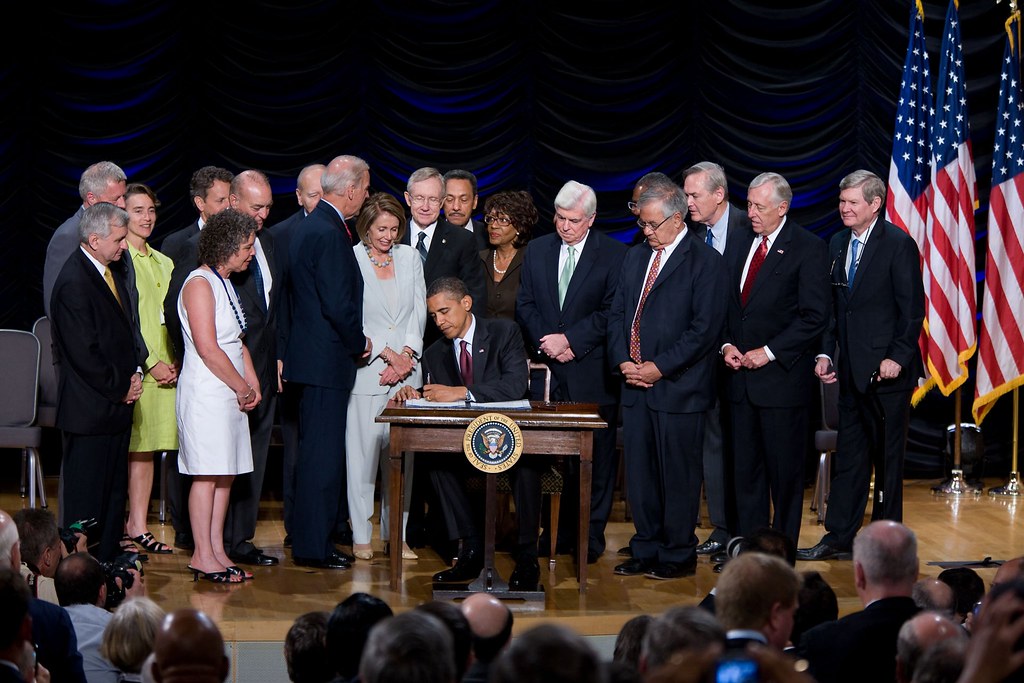Dodd-Frank: Nine and Nearly Orphaned
By Bartlett Naylor

Dodd-Frank just turned nine years old. There’s no party.
It’s been a rough childhood. On July 21, 2010 President Obama signed the birth certificate on the Dodd-Frank Wall Street Reform and Consumer Protection Act. The law was Congress’ response to the 2008 Wall Street crash. From the first, Dodd-Frank was born into a single parent home. It had little Republican support, with only two Republican senators supporting the Wall Street reform bill. The majority of Republicans bashed the foundling law from the start.
The average Democrat wasn’t a particularly caring parent to Dodd-Frank either. Regulators appointed by President Obama to write and implement the 400 new rules required by the legislation opted for some of the weakest options. For example, with the Volcker Rule, which was designed to reduce bank gambling, the regulators might have banned bank ownership of hedge funds. Instead, they permitted ownership in risky hedge funds and even delayed compliance with the few restrictions mandated in the law. And, while regulators increased the amount of capital banks must keep– meaning the ratio of their assets to liabilities– by a smidgen, it’s still far less than any prudent regulator would determine adequate.
With many other rules, the regulators took years to adopt. And some rules they’ve ignored altogether, such as the essential statute (Section 956) aimed at reforming bloated Wall Street pay. Worse, now regulators are focused on rolling back Dodd-Frank since conservatives in Congress and the White House approved a law (with faux sanctimonious name about job growth) that effectively put the young Dodd-Frank law in a time-out. Specifically, the 2018 law hampered Dodd-Frank’s development by deeming large banks with as much as $250 billion in assets were unworthy of special attention; small banks were permitted to gamble.
In one sense, Dodd-Frank wasn’t so much true Wall Street reform as a Congressional grievance to regulators to wake up and do their job moving forward. Regulators could have stopped the Wall Street crash had they been awake and zealous. They might have arrested the abusive, predatory loans that inflated the housing bubble. So, while Dodd-Frank has never been a perfect offspring of Congress, it represented the need to have stricter oversight of wayward banks.
That’s why Dodd-Frank also ushered in a new disciplinarian– a new agency named the Consumer Financial Protection Bureau (CFPB). Congress finally realized that consumer protection couldn’t be trusted to the same regulators as the Federal Reserve or Federal Deposit Insurance Corp. who also guard the safety and soundness of the bank. Bank’s traditional patriarchs running up to the crash had mistakenly viewed bank profits as a proxy for safety, overlooking the fact that those profits derived from consumer abuse.
Overall, this near orphan Dodd-Frank highlighted that in Washington, personnel is policy. Under Richard Cordray, the Obama-appointed director, the CFPB returned nearly $30 billion to some 12 million victims of unfair, deceptive, abusive, predatory lenders. Trump replaced Cordray first with Mick Mulvaney, a former congressmember who called the CFPB a “sad, sick joke” and then with Kathy Kraninger, a junior federal worker with zero background in consumer protection. In her first seven months, Kraninger has reduced enforcement actions and signed settlements that provide little relief to the victims. She says she wants to emphasize consumer education, essentially placing the burden on potential victims to beware of scams. That’s essentially like taking the lifeguard away from the pool and telling everyone that can’t swim to blow up their floaties.
What’s clear is that Dodd-Frank needs a sibling, a robust spawn to confront Wall Street with strict rules, not hollow requests to regulators to wake up and police. Congress must forbid banks from gambling by restoring the Glass-Steagall law. It should approve reforms that prevent private equity firms from gutting the likes of Toys R Us, as envisions in the new bill titled the “Stop Wall Street Looting Act,” introduced by Sens. Tammy Baldwin (D-Wisc), Sherrod Brown (D-Ohio), Elizabeth Warren (D-Mass) among others, and a host of enlightened House members such as Reps. Chuy Garcia (D-Ill.), Ayanna Pressley (D-Mass) and Ro Khanna (D-Calif.) Washington must arrest the destructive pay practices that not only motivate reckless lending, but bleed income from those who actually produce America’s goods and services and concentrate it with the few financial puppeteers.
As Dodd-Frank approaches its “tween” years, its clear our nation’s leaders should be paying it more attention lest the collective lessons we’ve learned since the crash also go ignored.